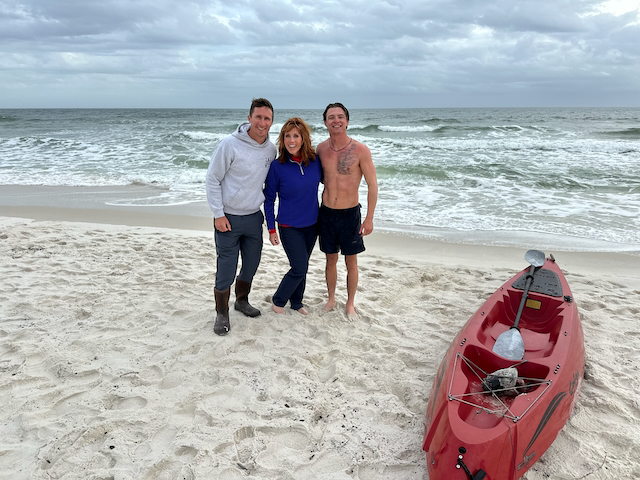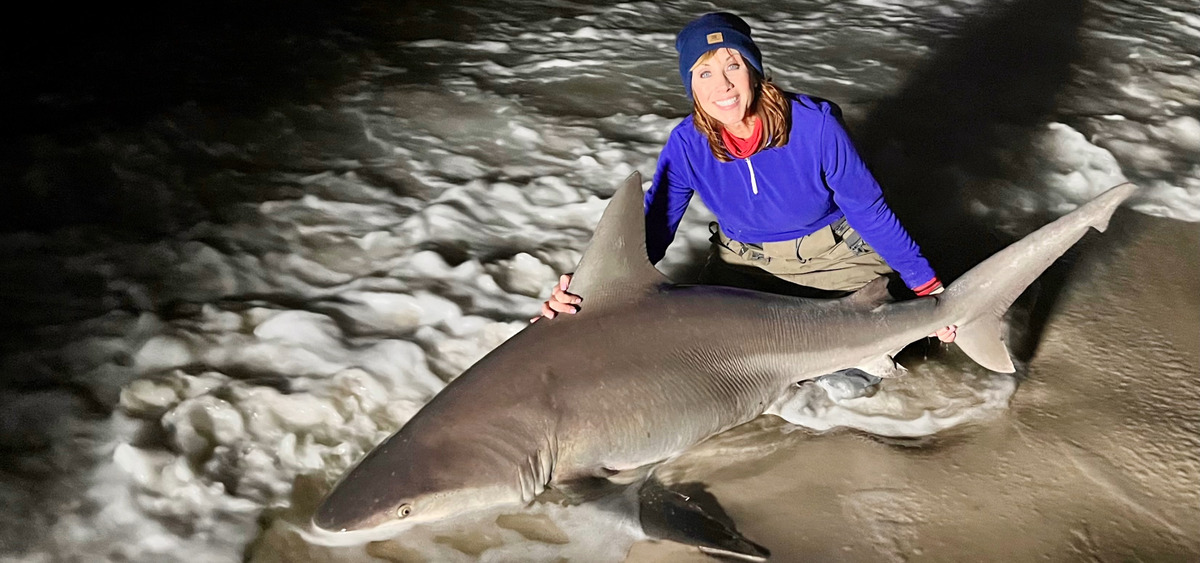Land-based Shark Fishing in Alabama
The fear of sharks is not uncommon and if you grew up obsessed with the movie Jaws like I did, then you know that the freight of these apex predators of the ocean is permanently ingrained in your psyche.
Shaking the shark intimidation is tough so when I had an opportunity to try land-based shark fishing in the Gulf Shores and Orange Beach in Alabama I had to do it. This would be a fishing experience unlike any other.
While I’ve fished for some of the largest and most unique species in the world, shark fishing from the shoreline in the Gulf of Mexico takes things to a new level.
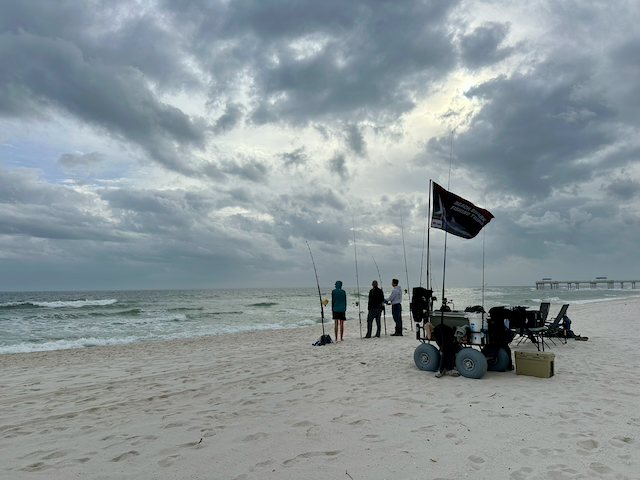
I teamed up with the experts at Coastal WorldWide for a night that would go down in my angling experiences as one to remember. While most shark fishing happens in deep offshore waters, land-based shark fishing is a unique approach. Coastal WorldWide owners, Dylan Wier and Blaine Kenny are the best at what they do and while they offer land-based shark fishing as an experience, their conservation lens impresses me most.
“This is really old-school,” said Wier. “You can catch 1,000-pound fish right from the beach.”
The Coastal WorldWide duo made headlines when they caught the first Great White shark from Orange Beach shores in Alabama in 2023 and caught a 12-foot Great White from Navarre Beach in Florida in 2024 weighing over 1,200 pounds.
What anglers might pull in from the shore is anyone’s guess given that Gulf waters are home to approximately 50 species of sharks. The most common catches are Sandbar sharks, Hammerheads, Black-tips, Tiger, Bull and Mako.
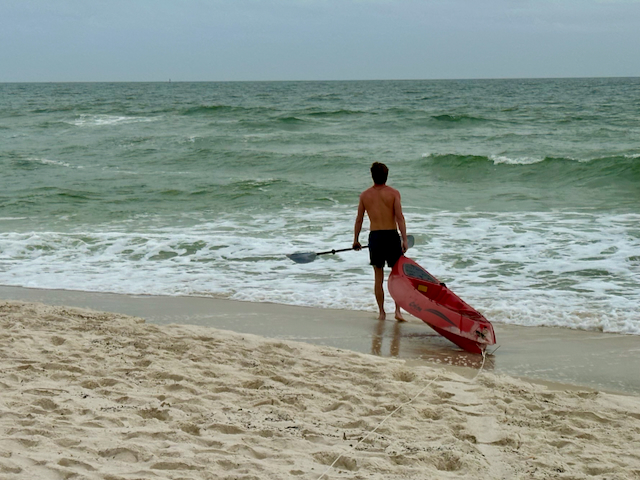
As we set up for the evening on the beach the first task was getting the massive cut bait into the water. After a few intense arm circles to warm up his muscles, Blaine kayaks through the surf to drop the three lines of bait past the sandbar at 200 yards, 400 yards, and 600 yards from the shoreline.
Then, it’s just a waiting game. The sun sets on the horizon, the beach goes dark except for our illuminated indicators on the lines and things get quiet. The anticipation makes me anxious. I know a hit could happen any minute. It could be immediately, hours from now, or not at all.
To pass the time we share evening pizza along with stories and laughter bonding over a shared passion for fishing.
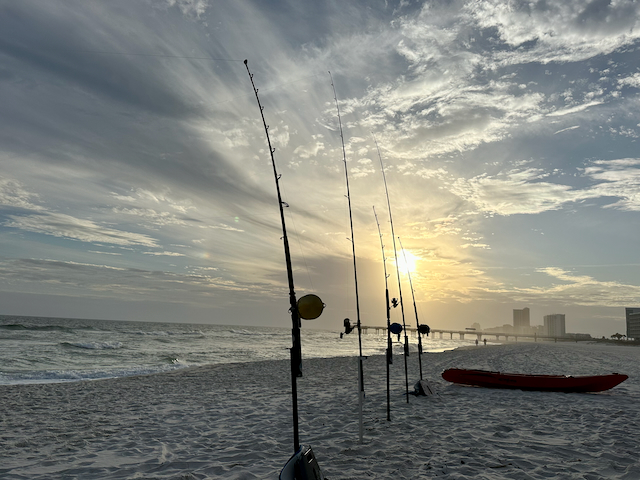
At 7:21 p.m. the sound of the bait clicker that makes every angler’s heart skip a beat happened.
It slowly picks up speed and takes only moments to realize that a shark is indeed hooked. I quickly jump into the specialized harness as the boys secure the rod and position it into my belt. The line is checked again to confirm the hookup and the clock starts. Timing the run is essential to ensure the shark’s safety so it does not swallow the hook.
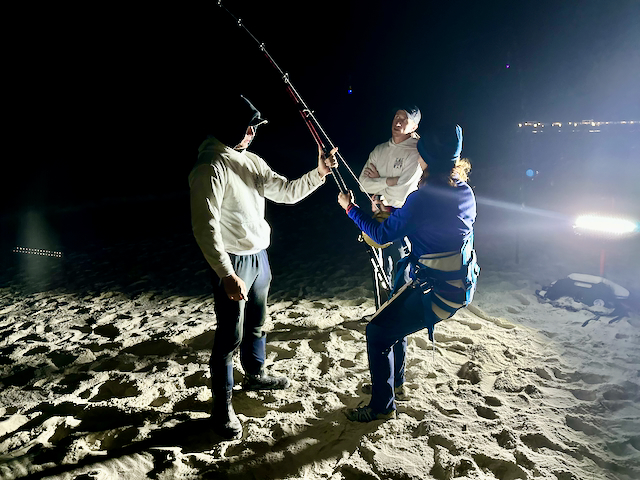
My first few turns of the reel seem almost too easy. Are we sure there’s a shark on there?
Feeling rather impressed at my progress it quickly becomes evident that the slack I’m picking up is the shark heading towards me – fast.
The line resistance quickly changes with a sudden force that nearly stalls any effort to turn the handle of my reel. Struggling to get one more turn, I feel a muscle pull in my shoulder. This is the moment I realized that this line placed 600 feet out into the surf. I had a long way to go to get this hefty shark in as safely and quickly as possible. This is perhaps the biggest challenge when doing land-based shark fishing. You’re not just fighting the fish, but also the swells of the surf and the ticking of the clock.
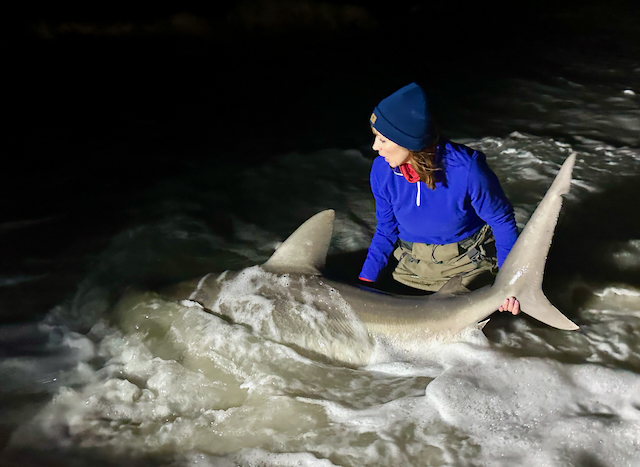
The guys coach me through the retrieval process and my body positioning as I reel in the slack and then struggle when the line is impossibly tight. Surprisingly, the shark does not run as it gets closer to shore, but instead, it’s a pull of stagnant weight. Endorphins are high and suddenly I see the dorsal fin rising through the waves– the iconic shark in the water image that has haunted me for a lifetime.
What a surreal moment, but it’s about to get even better.
We see that it is a stunning Sandbar shark and rather fat. As Dylan removes the hook what surprises me the most is that the shark is docile, and not showing the writhing and angry aggression that I expected. I run into the water for some quick photos before we release her back into the waves. To touch this magnificent creature and to be in the waves with it as it recovers is magical. It is an intimate moment with one of nature’s most feared and fascinating creatures allowing me to appreciate this species in the way that it deserves.
To release her quickly, we hold her by the tail and guide her to deeper water through the waves until she propels forward and disappears back into the darkness of the ocean.
As an angler, it is always exciting to catch a new species, but this was special because it was about more than just catching a fish. It was educational. I appreciate the opportunity to learn what Dylan and Blaine have cultivated through their land-based shark fishing expertise.
Land-based shark fishing is a rather unregulated industry, so it often gets a bad rap because of the operators who take a more savage approach to the practice, but Dylan and Blaine take a conservation-minded path to their business. Yes, they offer exciting fishing experiences for anglers, but it is also important for them to educate clients about the sharks they are catching, limit the amount of time bringing them in, and handle the sharks carefully during recovery. Coastal WorldWide is also involved in shark tagging efforts for conservation research.
Seeing these sharks first-hand through this experience is what connects anglers to the species and makes them care about their continued existence and survival.
